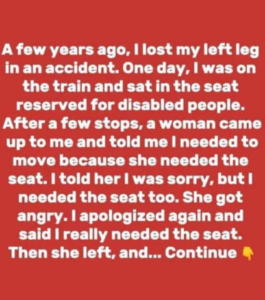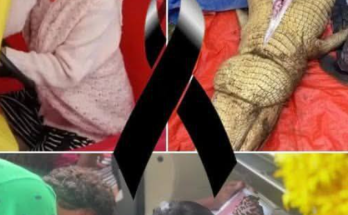A Girl With a Hidden Disability Didn’t Give Up Her Seat to an Elderly Woman and Now Feels Guilty
Emma sat on the crowded bus, clutching her backpack and trying to ignore the stares. She could feel the weight of judgment pressing down on her, even though no one said a word. An elderly woman had just boarded, glancing around for a seat. When Emma didn’t stand up to offer hers, a few passengers shot her disapproving looks.
She wanted to explain. She wanted to tell them that, even though she looked perfectly fine on the outside, she wasn’t.
A Battle No One Could See
Emma had a hidden disability—a chronic illness that caused debilitating fatigue and joint pain. On some days, she could walk short distances without issue, but on others, like today, even standing for a few minutes left her feeling weak and dizzy.
But no one could see that. She didn’t use a cane or a wheelchair. There was no visible brace or cast. To the world, she looked like a healthy young woman selfishly keeping her seat while an elderly woman struggled to stand.
The guilt gnawed at her, but she knew if she stood, she might not make it through the rest of her commute without collapsing.
The Silent Judgment
A man sitting across from her sighed loudly, shaking his head. Another woman whispered something to her friend, glancing at Emma disapprovingly. The elderly woman didn’t say anything, but she did let out a tired breath, gripping the handrail for support.
Emma lowered her eyes, feeling ashamed even though she knew she had done nothing wrong. Why did it feel like she had?
She wished she had the courage to speak up, to say, “I would stand if I could, but I physically can’t.” But how do you explain something invisible to a bus full of strangers who have already made up their minds?
Should She Have Said Something?
That night, Emma replayed the moment over and over in her head. Should she have told the elderly woman she had a disability? Would anyone have believed her, or would they have thought she was making an excuse?
People with visible disabilities often receive empathy and understanding, but those with hidden conditions face a different kind of struggle—one where they must constantly justify their needs to a world that assumes they are fine.
Learning to Let Go of the Guilt
Emma knew she had to remind herself of one thing: She was not in the wrong. Her disability was real, whether others could see it or not.
The next time something like this happened, she decided she wouldn’t let the guilt consume her. Maybe she would quietly say, “I have a medical condition that prevents me from standing.” Or maybe she wouldn’t say anything at all—because, at the end of the day, she didn’t owe an explanation to anyone.
The world often forgets that not all struggles are visible. Emma hoped that, one day, more people would learn to see beyond what the eye can perceive.
